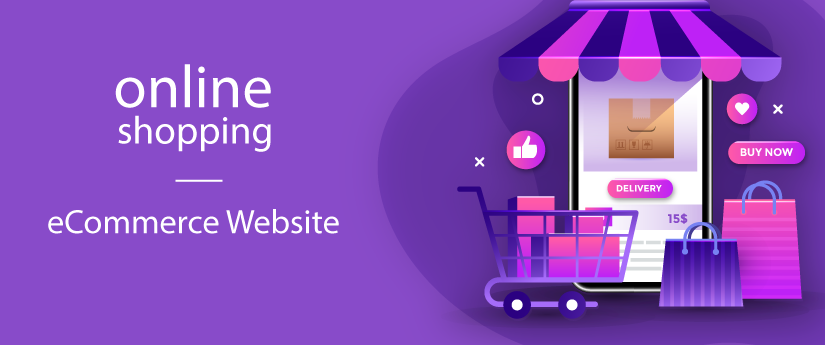With the advancement of technology and efficiency of internet access, it’s now increasingly more convenient to shop online. People can effortlessly browse and shop for products that match their needs without having to step outside. With e-Commerce website marketing, you can drill into this market more easily without having to worry much about sheer competition. So how about you own a virtual store, which starts in one click and shutdowns on another? Seems exciting and convenient, right? This is what Electronic Commerce or eCommerce does for you. When you build an eCommerce website, you become an online shop owner that can sell products, across all regions, despite country borders. This helps in expanding the target audience’s horizons and accelerates revenues.

The eCommerce trend is growing all around the world; it doesn’t look like slowing down. Currently, the sales are 14% worldwide, which are expected to hit 22% by the end of 2023.
Moreover, by the end of 2021; the market share of eCommerce is predicted to own 72.9% share of the market.
By the end of 2040, experts predicted that 95% of purchases will be made through eCommerce sites only – the figures are jaw-dropping, right?
We have a total of 2 billion online shoppers, who scroll for their coveted products on digital platforms and 61% of them do not compare shops if they find their desired product.
Usually, the audience is more active on phones and is more likely to make purchases through their phone instead of desktop.
If you create an eCommerce website, you can sell your product/service worldwide, without any limitation. People from all over the world can visit your website, make purchases and fuel your revenue. Buying from an eCommerce store means lying on your couch and shopping. This reduces all the hassle of taking out time from your busy schedule, going out, spending on high fares and wasting your energy. The same goes for the store owners. Rather than going to shop every day, you get orders on daily basis through your eCommerce site, and you just have to ensure the on-dot delivery. If you build an eCommerce website, you can market or promote the brand directly to the customer. Whenever someone purchases a product from you, they enter their email address/contact number. When you have these details, you can market your newly launch product through the email address, or take a follow-up regarding previously the product. This makes the bond stronger and consumer is more likely to return for new purchases.

With nearly every marketing process now taking place online, it can be tough to distinguish between the different types of digital marketing people use today. For example, take e-Commerce website marketing, what is it and how does it relate to practices like social media, content, search engine, and email marketing? eCommerce websites can use all of the above digital channels to promote a product and grow their business.
eCommerce marketers can use social media, digital content, search engines, and email campaigns to draw visitors and promote purchases online. Before we jump into more detail about what eCommerce website marketing is and how to execute a strategy of your own, let's review the definition of eCommerce advertising and advertising's parity with marketing for an eCommerce business.

To give you a sense of what an eCommerce marketing strategy looks like, here are some common marketing ways and how you'd use them to build an online store.
Brands, publishers, entrepreneurs, and expanding businesses all launch pages on today's most popular social networks to connect with their audience and post content that the audience is interested in. As an eCommerce marketer, you can do the same thing, but the campaigns you operate might look a bit different, and not every social network is a good fit for your needs. eCommerce websites are extremely visual, you have to show off the goods, after all, so your progress on social media depends on your method of imagery to drive attention and traffic to your product pages. Instagram is a suitable platform for eCommerce businesses because it allows you to post sharp product photography and develop your product's reach beyond its purchase page.
When you hear "content marketing" you might think of blogging and video marketing, content that is meant to grow your website's ranking in search engines and answer questions related to your industry. But if you're selling a product online, do you actually need articles and videos to generate transactions? You sure do. Here are some steps to use content to market your eCommerce store.
Optimize your product pages for small, product-driven keywords that incorporate the name of the product. If you trade wedding dresses, for example, a Google search for "bridesmaid dress" is more likely to produce product pages like yours if you’ve included that term on the page.
If you manage an online wedding dress store, writing blog posts about "how to plan a wedding" can draw everyone involved in wedding preparations no matter where they are in the planning process. As visitors become more engaged, you can produce posts that will move them into consideration, like “how to select the appropriate wedding dress", and turn them into leads, like a downloadable “wedding planning checklist”.
Electronic Commerce or eCommerce is the virtual store that opens and closes with a single button. It is a new trend, which has a lot of room for success. People globally are stepping into this field, and the figures are jaw-dropping. It is foretold that by the end of 2021, eCommerce might be sharing 79% of the market share. LinsDigital in Malaysia is a complete resolution providing digital solutions for your business. The digital marketing company has exceptional digital solutions. For more information about us, please visit our official website.